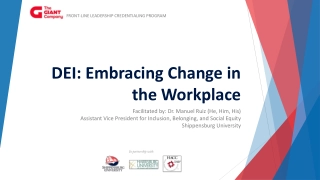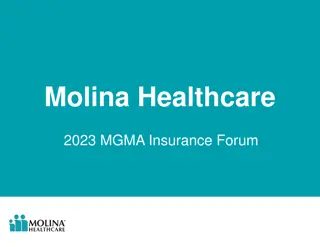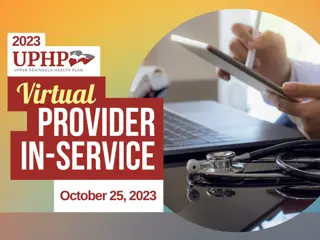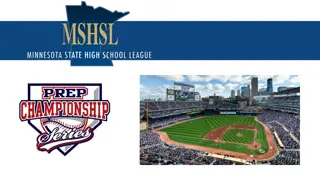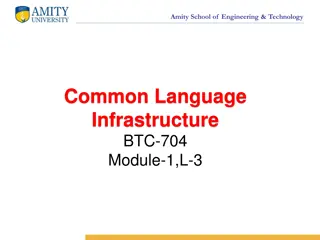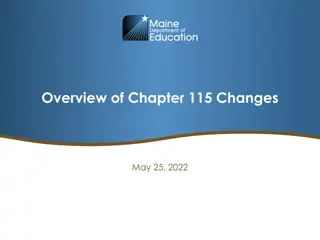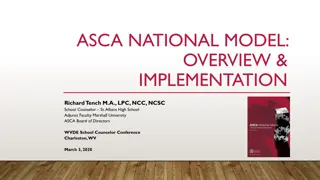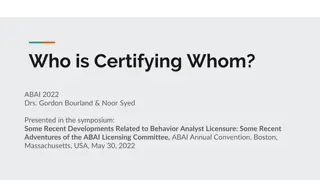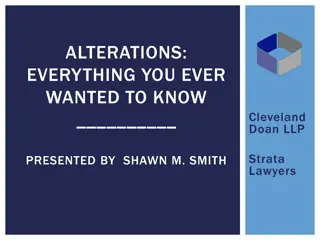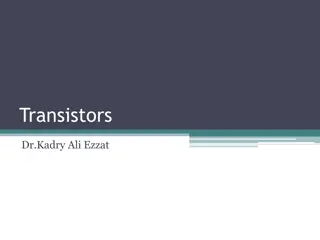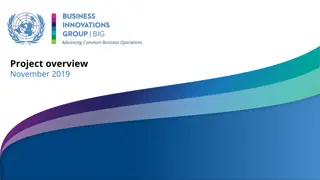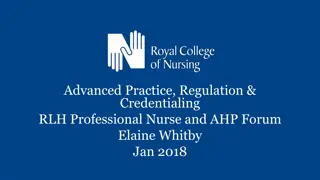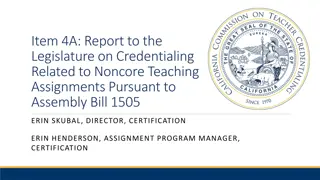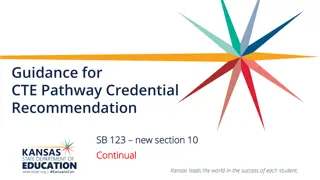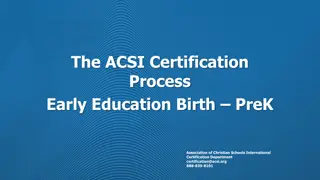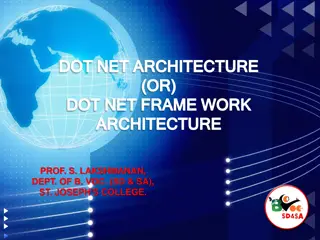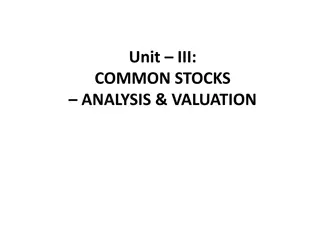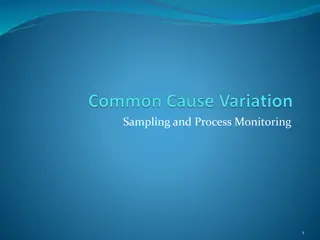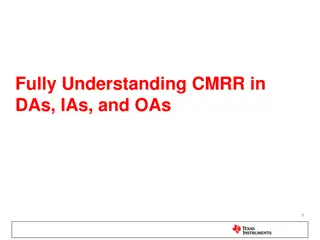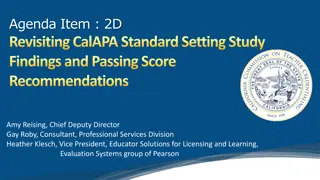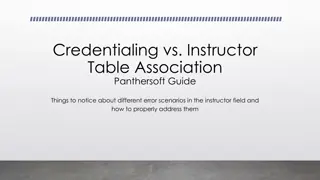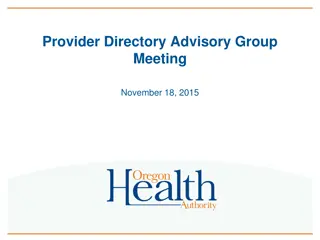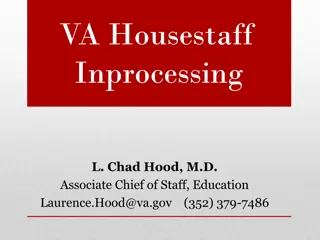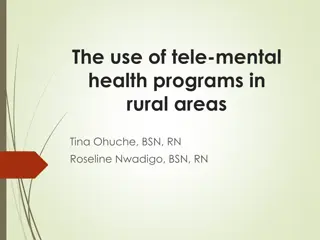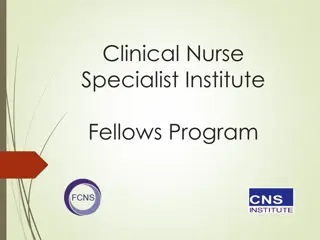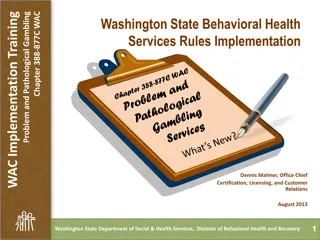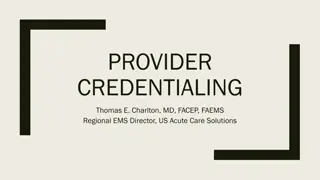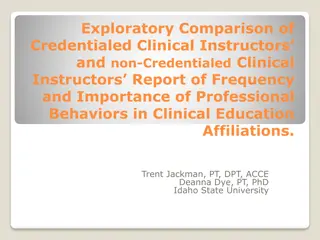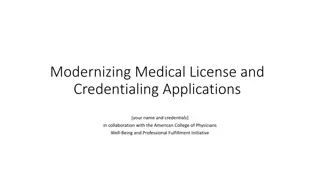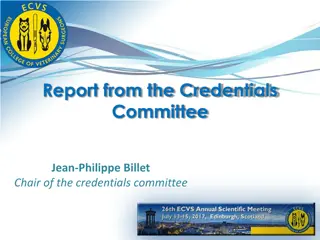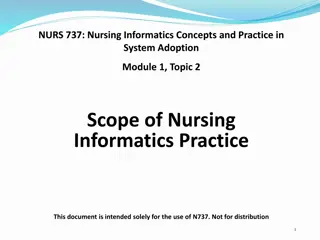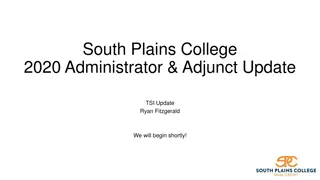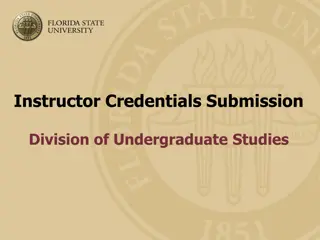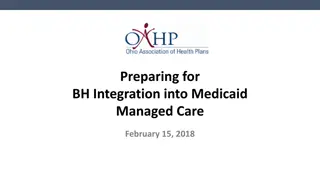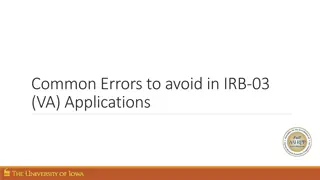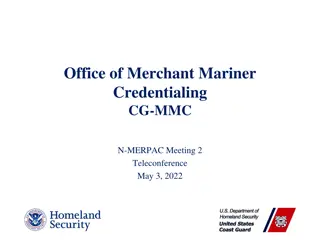Front-Line Leadership Credentialing Program: Embracing Diversity, Equity, and Inclusion
This program, facilitated by Dr. Manuel Ruiz, focuses on educating participants about diversity, equity, and inclusion in the workplace. Through various activities and discussions, attendees gain a deeper understanding of DEI concepts, learn to embrace change, and explore the importance of creating
1 views • 20 slides
Molina Healthcare Provider Network Overview
Molina Healthcare offers a comprehensive provider network in Mississippi, focusing on delivering high-quality healthcare services to its members. Learn about joining their network, centralized credentialing process, vision, mission, and the key to successful collaboration. Access their website for m
2 views • 27 slides
Provider Relations and Credentialing Updates
CHAMPS Enrollment reminder for all providers and facilities, with instructions provided for reactivation if necessary. The UPHP Credentialing Department has implemented CAQH ProView to streamline credentialing processes, reducing paperwork. Important MDHHS links are shared for notifications and info
14 views • 128 slides
Credentialing Process for Adjuncts and GTAs Created by Felipe Vargas
This process overview details the steps and requirements for credentialing adjuncts and Graduate Teaching Assistants (GTAs). It covers accessing the Wizard program, submitting necessary documents, and the workflow from department to Provost. Various credentialing avenues are explained based on degre
0 views • 20 slides
State Tournament 2024: Important Information for Participants and Spectators
Congratulations on qualifying for the 2024 State Tournament! This comprehensive agenda covers resources, expectations, participation guides, seeding, ticketing details, apparel information, streaming options, media credentialing requirements, timelines, and venue specifics. Ensure you're well-prepar
0 views • 16 slides
Understanding Amity School of Engineering & Technology's Common Language Infrastructure (CLI)
Explore the intricate details of Amity School of Engineering & Technology's CLI, including Common Language Infrastructure, Common Type System, and Common Data Types. Learn about the principles, specifications, and components that enable cross-language development and interoperability within the engi
2 views • 41 slides
Understanding Common Welfare in Narcotics Anonymous
Explore the concept of common welfare in Narcotics Anonymous, where prioritizing the well-being of the group over individual desires leads to unity and growth. Discover how this principle guides members to support each other and the fellowship for mutual recovery and success. Learn how Tradition Fou
0 views • 15 slides
Overview of Chapter 115 Changes and Impact on Educators
Highlights key changes in Chapter 115 regulations impacting educators regarding renewals, rule versions applicability, application evaluation dates, removal of PRAXIS exam requirements, and specific changes in out-of-state licensure, emergency certificates, alternative education teacher requirements
0 views • 14 slides
Overview of ASCA National Model Implementation by Richard Tench
This overview discusses the ASCA National Model and its implementation in school counseling programs. It covers important matters such as training, credentialing, and counselor-to-student ratios. The model's purpose is to enhance student outcomes by defining, managing, delivering, and assessing comp
0 views • 23 slides
SMSU College Now Summer Workshop August 4, 2020
SMSU College Now Summer Workshop on August 4, 2020, includes updates on NACEP Accreditation Approval, schedule for the day, credentialing qualifications, and information on faculty credentialing. The event features various academic sessions and interactions with university officials.
0 views • 8 slides
Sociology and Common Sense: Exploring the Boundaries
Sociology and common sense intersect in intriguing ways, with common sense offering raw material for sociological theories yet lacking the validity and reliability that sociology strives for. While common sense is rooted in tradition and often status quoist, sociology challenges the taken-for-grante
2 views • 11 slides
Understanding Professional Credentialing: Importance and Common Requirements
Professional credentialing plays a crucial role in ensuring the qualifications and expertise of individuals in various fields. This article explores the concept of credentialing, its significance, common forms, basic requirements, and the importance of credentialing in protecting the public and upho
0 views • 26 slides
Understanding Strata Plans and Common Property
In this informational document presented by Shawn M. Smith of Cleveland Doan LLP Strata Lawyers, you will learn about the different types of strata plans, including conventional and bare land plans, as well as the concept of common property and limited common property in strata developments. The doc
0 views • 62 slides
Understanding Bipolar Transistor Configurations for Electronic Circuits
Explore the three common configurations - Common Base, Common Emitter, and Common Collector - for Bipolar Transistors in electronic circuits. Each configuration offers unique characteristics such as voltage gain, current gain, and impedance levels, impacting the signal processing and amplification c
0 views • 27 slides
Advancing Common Business Operations Overview
Advancing Common Business Operations in November 2019 focuses on key targets and enablers such as Business Operations Strategy, Common Back Offices, Global Shared Service Centers, Common Premises, Mutual Recognition, Client Satisfaction Principles, and Costing & Pricing Principles. The project aims
0 views • 17 slides
Emerging Trends in Regulation and Credentialing for Advanced Practice Nursing
Explore the evolving landscape of regulation and credentialing in advanced practice nursing, including inconsistencies in titles, the debate between regulation and credentialing, and the challenges and purposes of regulation. Discover the impact on roles, education, and patient safety in this rapidl
0 views • 22 slides
Report on Credentialing for Noncore Teaching Assignments under Assembly Bill 1505
This report discusses credentialing practices for noncore teaching assignments in the education sector, focusing on charter and non-charter schools. The findings reveal challenges in assigning appropriately credentialed educators, particularly in core classes. Survey respondents expressed concerns a
0 views • 8 slides
Guidance for CTE Pathway Credential Recommendation SB.123
The document outlines the requirements and processes related to career and technical education credentialing in Kansas, focusing on industry-sought credentials, high-value and standard credentials, and surveys conducted by the Kansas State Department of Education. It highlights the importance of app
0 views • 8 slides
ACSI Certification Process for Early Education: Strengthening Christian Schools
ACSI Certification aims to enhance Christian schools by credentialing educators meeting educational and biblical criteria. Types of certification include Early Education Teacher, Director, Provisional, Standard, Professional, and Lifetime. Requirements vary based on certification type. To apply for
0 views • 14 slides
Understanding .NET Framework Architecture and Common Language Runtime
This content delves into the intricacies of .NET architecture, highlighting its structure, common language runtime, and key components such as Common Type System (CTS) and Common Language System (CLS). It explains how .NET supports multiple languages, facilitates cross-language interoperability, and
0 views • 13 slides
Understanding Common Stocks: Analysis & Valuation
Common stock represents ownership in a company, entitling shareholders to assets and earnings. Shareholders have rights such as electing the board of directors and limited liability. Common stocks are valued based on future cash flows. There are two main types of stocks: common and preferred. Valuat
0 views • 17 slides
Understanding Common Cause Variation in Sampling and Process Monitoring
Common cause variation is inherent to a process and represents background noise that can obscure signals of special cause variation. Sampling plans and rational subgrouping help estimate and manage common cause variation in quantitative data. Estimating common cause involves assessing variation with
2 views • 11 slides
Understanding CMRR in Differential Amplifiers
Differential input amplifiers, including operational, instrumentation, and difference amplifiers, play a crucial role in amplifying differential signals while rejecting common-mode noise. The Common-Mode Rejection Ratio (CMRR) is a key parameter in these amplifiers, indicating their ability to suppr
0 views • 48 slides
Overview of CalAPA Standard Setting Study and Passing Score Recommendations
This document provides updates on the California Administrator Performance Assessment (CalAPA) development and standard setting process for Commission examinations. It includes information on the implementation timeline and recommendations for revising the passing score standard for the CalAPA. The
0 views • 19 slides
Addressing Error Scenarios in Instructor Field for Proper Credentialing
Properly handling error scenarios in the instructor field such as adding primary or secondary instructors, course assistants, and administrators. Learn about credentialing processes, instructor table associations, and how to address common issues effectively.
0 views • 4 slides
Provider Directory Advisory Group Meeting Summary
The Provider Directory Advisory Group Meeting held on November 18, 2015, covered various topics including Clinical Quality Metrics, Registry Presentation, Procurement updates, and Common Credentialing. The meeting involved breakout sessions, group discussions, and group presentations focusing on ref
0 views • 48 slides
VA Housestaff Inprocessing Guidelines and Requirements
In preparation for the upcoming orientation program, housestaff members at the VA facility must complete various forms and training, including submitting proof of Mandatory Training for Trainees (MTT) completion. Required documents and procedures involve credentialing, computer access forms, ID badg
0 views • 28 slides
Transforming Mental Health Care in Rural Areas through Tele-Mental Health Programs
Tele-mental health programs utilize various technologies such as web-based interventions, mobile phone communication, video-conferencing, and internet games to provide psychiatric mental health services to patients in remote areas. Best practices include ensuring patient privacy, encryption of messa
0 views • 15 slides
Clinical Nurse Specialist Institute Fellows Program Overview
The Clinical Nurse Specialist Institute Fellows Program aims to recognize and advance the contributions of clinical nurse specialists in healthcare. Established in 2019, this program honors achievements that promote leadership, impactful work, visibility, full scope practice, data-driven projects, a
0 views • 22 slides
Washington State Behavioral Health Services Rules Implementation
This document outlines the implementation training for problem and pathological gambling in Washington State, including requirements for certification and licensing of counselors, agency compliance, service plans, and licensure processes. It emphasizes the importance of training and certification fo
0 views • 6 slides
Understanding Provider Credentialing and Why It Matters in Healthcare
Provider credentialing involves ensuring healthcare professionals have the necessary qualifications and competencies to practice. It is crucial for legal protection, maintaining high standards of care, and instilling confidence in patients. Credentialing involves assessing education, training, and s
1 views • 13 slides
Comparison of Professional Behaviors in Clinical Education
Professional behavior characteristics play a crucial role in enhancing student learning during clinical education. This study examines the differences in reported importance and frequency of professional behaviors between credentialed and non-credentialed clinical instructors. The background outline
0 views • 28 slides
Modernizing Medical License and Credentialing Applications in Collaboration with American College of Physicians
Collaborating with the American College of Physicians, we are modernizing medical license and credentialing applications to prioritize clinician mental health, remove barriers to seeking mental healthcare, and promote well-being and professional fulfillment. By emphasizing the importance of support
0 views • 16 slides
Annual Report and Credentials Process Overview
The report from the Credentials Committee chaired by Jean-Philippe Billet highlights key committee members, deadlines for submissions, and statistics on credentials applications and annual reports. The document also provides insights into the recertification committee, responsibilities of program di
0 views • 23 slides
Understanding the Scope of Nursing Informatics Practice
Nursing Informatics Practice encompasses the specialized roles, competencies, and standards that informatics specialists and nurses utilize to manage data, information, and knowledge in healthcare settings. It focuses on leveraging technology and NI tools to enhance decision-making and support nursi
0 views • 20 slides
South Plains College 2020 Administrator & Adjunct Updates on TSI Changes
South Plains College 2020 Administrator & Adjunct Updates highlight changes in TSI requirements, dual credit eligibility, and the launch of TSIA 2.0. The updates address COVID-19 responses, college readiness, required scores, and dual credit credentialing criteria. For more information, contact Ryan
0 views • 35 slides
Credentialing Requirements for Faculty and Teaching Assistants in Undergraduate Studies
Credentialing for instructors in the Division of Undergraduate Studies ensures adequate preparation to teach assigned courses, aligning with institutional accreditation standards. Policies and procedures are outlined for faculty and staff members, including TAs, emphasizing the need for specific qua
0 views • 17 slides
Medicaid Managed Care Integration Preparation Overview
Medicaid Managed Care providers in Ohio are gearing up for the integration of Behavioral Health services. Efforts include provider outreach, readiness activities, transitions of care guidelines, prior authorizations, and credentialing processes. The timeline, requirements, and testing opportunities
0 views • 11 slides
Common Errors to Avoid in IRB-03 (VA) Applications Overview
This presentation covers key aspects of IRB-03 (VA) applications, including identifying VA resources, training requirements, storing PHI data, email usage, and more. It emphasizes proper procedures to prevent common errors in the application process. Learn about VA resources, credentialing, data sto
0 views • 10 slides
Mariner Credentialing Program Transformation Overview
The Mariner Credentialing Program is undergoing significant transformations, as evidenced by various meetings, regulatory projects, policy publications, appeals statistics, and outcomes. Key developments include regulatory amendments, policy changes, and initiatives such as the IMO Sub-committee on
0 views • 12 slides
